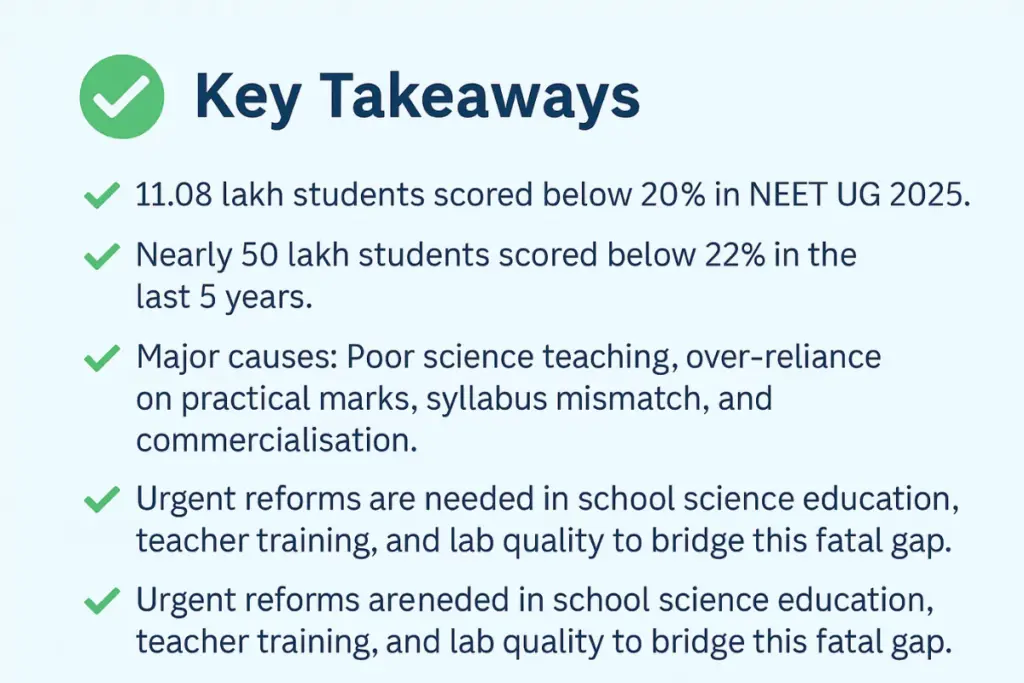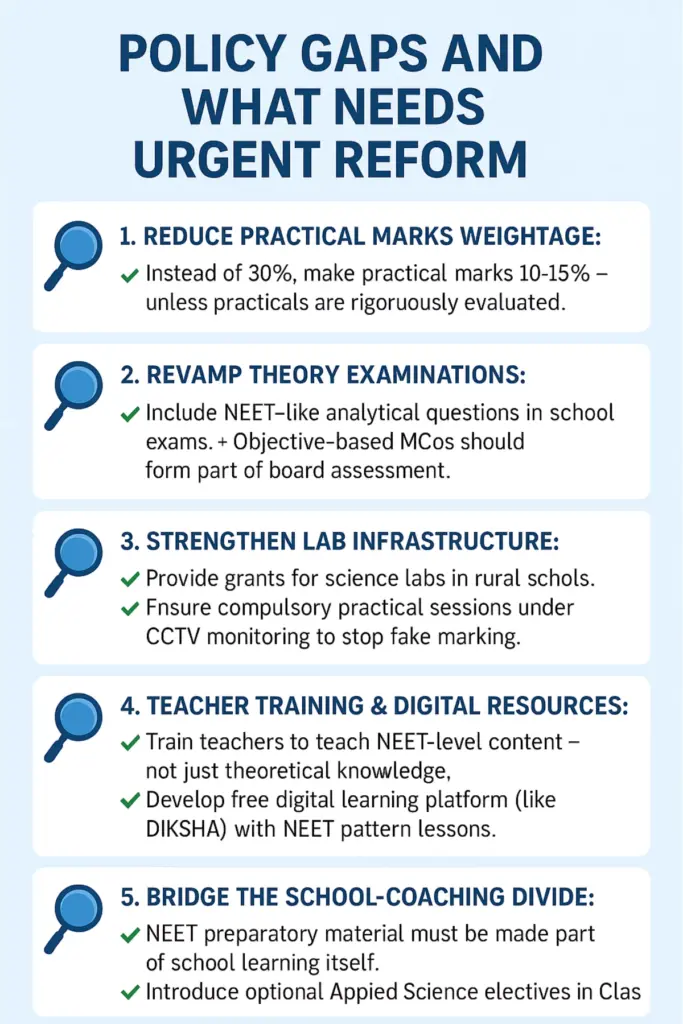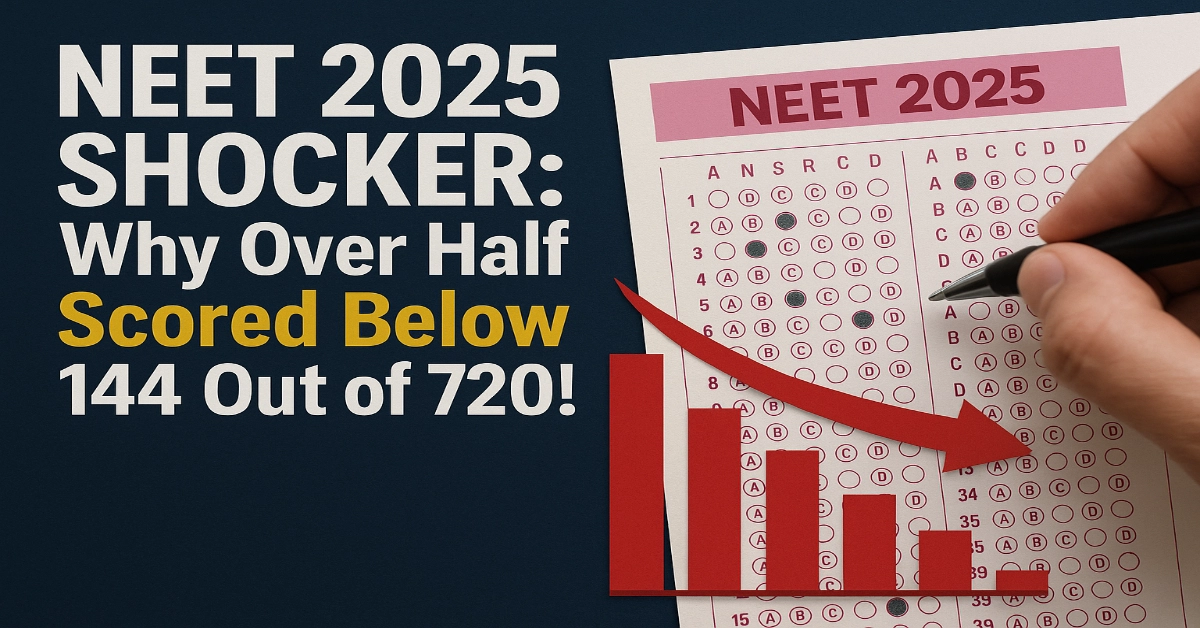NEET UG 2025 Result: The recently published NEET UG 2025 result by NTA has once again highlighted a worrying trend in India’s science education. Out of the 22.09 lakh students who appeared for the exam this year, a staggering 11.08 lakh candidates could not even score 20% marks (144 out of 720), the minimum marks needed for participating in NEET counselling.
This is not a one-off situation caused by a difficult paper or tougher evaluation. For the last five years, this trend has remained consistently high, raising serious concerns about the quality of science education at the senior secondary (Class 11–12) level across the country.

5-Year NEET UG Score Data (2021-2025)
| Year | No. of Students Scoring Below 20-22% | Percentage Marks Cut-off Considered |
| 2021 | 7.74 lakh students | 19.16% |
| 2022 | 8.83 lakh students | 16.25% |
| 2023 | 10.24 lakh students | 19.02% |
| 2024 | 11.68 lakh students | 22.5% |
| 2025 | 11.08 lakh students | 20.00% |
In the last five years, 49.57 lakh students, almost 50 lakh aspirants, have failed to cross the 20-22% mark in NEET UG. This shocking consistency exposes deeper, systemic problems in India’s school-level science education system.
Read Also: NEET UG Reform: Policy to Reduce Coaching Dependence and Dummy Schooling
Why Are So Many Students Failing to Score Basic Marks in NEET?
Lack of Conceptual Clarity in Science Subjects
NEET UG tests the candidate’s understanding of Physics, Chemistry, and Biology, subjects that demand conceptual and application-based learning. Unfortunately, most school systems, especially in state boards and rural areas, focus on rote memorisation rather than deep conceptual understanding.
Students cannot solve NEET-style problem-solving or analytical questions. Physics remains the weakest subject due to a lack of numerical practice and application-based learning.
Flawed Practical Examinations
In CBSE and most state boards, about 30% weightage is given to practical exams in Class 11 & 12. However, in reality:
- Practical marks are easily “adjusted” or gifted to ensure students pass, even if they never performed real experiments in the lab.
- This leads to inflated board results, 90% school pass rates, but no real scientific skills.
When the same students face NEET UG, which has no such manipulation, they fail badly.

Mismatch Between School Curriculum & NEET Syllabus
A critical problem is the mismatch between the school board exam pattern and NEET UG’s application-oriented questions:
- Boards ask direct, theory-heavy questions, rarely testing real-life application.
- NEET UG focuses on MCQs that demand logic, problem-solving, and interdisciplinary application.
This results in a huge performance gap.
Commercialisation of the Education System
- Many schools, especially private ones, focus on board exam results only to market their “100% pass rate” records.
- NEET-level critical thinking or practical exposure is neglected.
- Coaching institutes flourish by exploiting this gap, but lakhs of students cannot afford them, especially in rural, tribal, and EWS sections.
Low-Quality Teaching & Poor Lab Infrastructure
- In many government and rural schools, there are no functional science labs.
- Teachers are often untrained to deliver NEET-level content.
- Lack of English medium NEET resources in rural areas further disadvantages aspirants.
The False Comfort of High Board Results
- Every year, state and CBSE boards declare Class 12 Science stream pass rates exceeding 85%-90%.
- This does not reflect real knowledge or competitiveness, NEET UG results expose the truth.
- Students who secure 90%+ in board exams are sometimes unable to even cross 20% marks in NEET UG, proving severe gaps in evaluation methods.
The failure of more than half of NEET UG aspirants to even cross the 20% mark is not the fault of the students alone, but the result of years of systemic neglect of science education quality in India’s schools.
Unless the school curriculum, teacher quality, evaluation methods, and lab infrastructure are reformed, lakhs of talented but underprepared students, especially from rural and economically weaker backgrounds, will continue to fail NEET and lose the dream of becoming doctors.
India needs urgent, practical educational reforms, not cosmetic changes, to fix this deep-rooted problem.



Excellent one,
Most practical and realistic write up 👍
It should reach to 10th and 11th, 12th boards of all our indian states and also CBSE, ICSE boards.
Yes sir, I totally agree with you. Students must understand the importance of practical and conceptual skill in science. And this they can get only at schools, not at costly coaching institutes.